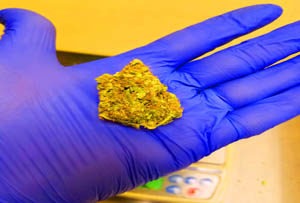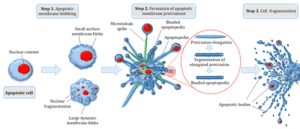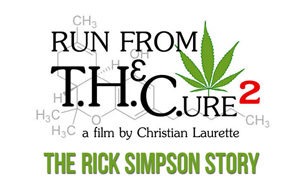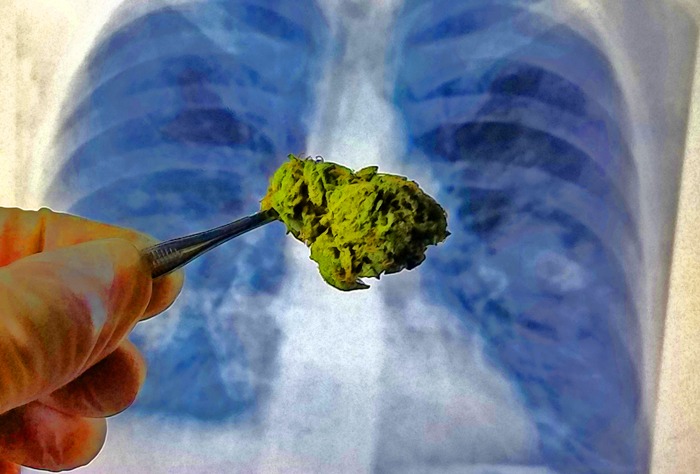BY MIKEL WEISSER
Let’s get this over with from the start: Yes, absolutely, cannabis can and does cure cancer.
Case closed. If only.
Well, at least the research is in. Cannabis does cure cancer; but not in every case and not every cannabis cures every cancer. And we still have a lot to learn. You probably already guessed as much. But, you won’t learn more about the new acceptance of this age-old assertion if you’re waiting for the story through mass media. Despite an entire election year of cannabis discussion, very little reporting got to the mainstream about the ultimate alternative medication’s most miraculous property.
But even as firebrand reefer mad-hatters continue to scare the public w discredited surveys and outright deceptions, the official government agencies in countries around the world are quietly updating their websites to acknowledge cannabis’ curious curative power over cancer. Meanwhile major pharmaceutical companies in the far corners of the globe are racing to perfect a marketable version of nature’s medicine.
Here’s the story they can no longer hide, but are hoping you won’t know, a hidden story going back farther than the medical marijuana movement. For decades, the powers-that-be denied it could possibly be true. But scientists around the planet kept asking the big question: What if cannabis could defeat the emperor of all maladies? “The Big C,” Cancer. The simple smarty-pants reply seems something like, “If it could indeed do that, wouldn’t we know about before by now?”
The truest answer to that question appears to be either, “not necessarily,” or “we already did.”

“Run from the Cure”
One of the things we often hear is that too little is known about cannabis. Yet, a browse through the National Center for Biotechnology Information, U.S. National Library of Medicine’s mammoth 67 page list of over 1300 cannabis cancer studies published since 1999 should quickly dispel that myth. Modern research has come in fits and starts as various political leaders demonized the weed for political gain. But that attitude is a fairly recent development. After millennia of use in eastern medical traditions, cannabis first became accepted as western medicine in 1839, when an Irish doctor, William Brooke O’Shaughnessy returned from India with a report on the medical uses of the common hemp plant, cannabis.
By 1850, cannabis was recognized by the American Medical Association as highly therapeutic in its concentrated form. It was touted as a cure-all for dozens of ailments, including cancer, during its days as a recognized American pharmaceutical product (1850-1937). Since the 1937 Marihuana Tax Stamp Act, the official government line was the stuff was poison. As dangerous for you as heroin, more carcinogenic than tobacco, with no medical value whatsoever.
Fast forward through the 1960s and Rafael Mechoulam’s Israeli research on THC and CBD, past the 1970 intensification of Nixon’s War on Drugs and scheduling of cannabis as a Class 1 controlled substance. Past the censored studies of the 1970s and the “Just Say No” propaganda of the Reagan Years. By the 1990s, cannabis researchers discovered the endocannabinoid receptor system and established a solid biological foundation for the claims that cannabis not only was not a poison, but could improve human health.
Of course, the official response was to escalate the denials, though the cure was literally in the palms of their hands.

“Destroy all records”
So, what’s going on? Why so much confusion? Cancer is one of the leading causes of death on the planet and cannabis is the most studied plant in history. Why do so many agencies act like there’s no conclusive evidence thus far with so many studies readily at hand? Some suggest the truth is being covered up.
One of the central tales of suppressed research took place in 1974 at the University of Virginia. AlterNet writer Raymond Cushing retold the story in 2000, as the modern age of cannabis research was still in its infancy. “In 1974 researchers at the Medical College of Virginia, who had been funded by the National Institute of Health to find evidence that marijuana damages the immune system, found instead that THC slowed the growth of three kinds of cancer in mice — lung and breast cancer, and a virus-induced leukemia.” Researchers further found extended their lives by 36%.
Instead of awarding the researchers a prize, the federal government shut down the program and within two years shut down all cannabis research across the country. Under orders from President Ford, the government began a project to destroy all records of any positive results from cannabis studies. One can only imagine the information lost in the purge.
Famed cannabis historian and activist Jack Herer wrote of cannabis as a cancer treatment and the suppression of research in his 1985 canna-classic, The Emperor Wears No Clothes. Herer goes so far as to say the success of the 1974 University of Virginia study is the reason the Ford Administration shut down all research into positive effects of cannabis in 1976, ending an era. The impact of that decision on US health cannot be calculated. As Herer noted, “Millions of Americans who might be alive today are dead because of these and other DEA orders regarding marijuana.”
For decades, all US research on the positive effects of cannabis was blocked. When Dr. Arthur Taskent wanted to study the rumor that cannabis prevented lung cancer he had to apply for a grant to show it caused cancer instead.

Most Censored Story
A more recent example was the now-famous 2000 Madrid study that showed massive doses of THC reversed brain tumors in rats. The results were so under-reported, the story wound up listed in the book, Censored 2001, the top 25 censored news stories of the year, an annual survey published by media watchdog, Project Censored. Project editor, Peter Phillips also found evidence that in 1983, the Reagan Administration had tried to pressure US universities to destroy any cannabis research they had on hand prior to 1976.
Apparently, the purge worked. When the Spanish scientists looked for references to the 1974 Virginia study, the entire event appeared to have vanished. Instead of promoting Guzman’s discovery the US government, “granted exclusive research rights to major pharmaceutical companies, who set out — unsuccessfully — to develop synthetic forms of THC that would deliver all the medical benefits without the “high.” Dr. Manuel Guzman of Complutense University of Madrid called the research censorship, “intellectual castration.”
By the beginning of this century the US government had conducted enough of its own research on the topic to file for its own patent for cannabis as an antioxidant and neuroprotectant. Strangely enough, despite holding the patent for medical uses of cannabis, other branches of the government, the DEA, Treasury Department, law enforcement and the court system continued to treat cannabis like a controlled substance and controlled the information stream on the topic.
This revelation gives credence to one of the most widespread stories about the fight to keep cannabis’s healing powers hidden from the public–the story that the US government has known for years that cannabis cures cancer. Natural Society’s Barbara Minton researched this story to find it absolutely true.
“Cannabinoids … inhibit tumor growth by … blocking the development of blood vessels needed by tumors to grow”
In 2015 the American National Cancer Institute website finally added a section on cannabis’ antitumor properties that concluded, “Studies in mice and rats have shown that cannabinoids may inhibit tumor growth by causing cell death, blocking cell growth, and blocking the development of blood vessels needed by tumors to grow. Laboratory and animal studies have shown that cannabinoids may be able to kill cancer cells while protecting normal cells.”
At the time, Minton was thrilled at the truth coming forward, “after decades of the demonization of marijuana by a federal government that supports pharmaceuticals and GMOs, there is a breath of change.” Three years later, the public is still largely in the dark, even though the evidence is hiding in plain sight.
“Antitumor effects by various mechanisms”
As of 2017, any American can plainly find that our government acknowledges cannabis is therapeutic, even if they don’t want word to get around. The official US government position on the question can be found at the National Institute of Health.
NIH’s National Cancer Institute, after making the expected warnings that cannabis is federally illegal in the US and has not been approved for cancer treatments by the FDA, plainly states that “Cannabinoids may have benefits in the treatment of cancer-related side effects.” The site also acknowledges that two cannabis-based pharmaceuticals, “dronabinol and nabilone, are approved drugs for the treatment of cancer-related side effects.” This is quite a step forward from the 1970s when NIH made a crusade out of destroying all extant research.
On a separate page, NIH discusses cannabis’ potential as an “anti-tumor” therapeutic agent at length: “Cannabinoids may cause antitumor effects by various mechanisms, including induction of cell death, inhibition of cell growth, and inhibition of tumor angiogenesis invasion and metastasis.[9–12]”

(To translate: Cannabis reinforces cellular lifecycle programming, reminding malignant cells to die off, a process called apoptosis. Angiogenesis is the development of blood vessels, which a tumor uses to feed itself and grow. Cannabinoid therapy inhibits that growth, which in turn limits the growth of tumor cells. Cannabis also appears to corral cancer cells and stop them from migrating to other parts of the body, causing the cancer to spread or metastasize.)
NIH goes on to list multiple studies that inconclusively suggested cannabis increased certain cancer risks, though it also acknowledges multiple studies which refute the suggestion that cannabis can be linked to lung cancer. But, when comes to using cannabis to fight cancer, NIH claims it knows of no study that definitively confirms cannabis’ antitumor effects. Then grants that there was “a single, small study” suggesting THC has “potential antitumoral” effects on patients with recurrent glioblastoma multiforme (a common form brain cancer). They also acknowledge cannabis can aid in treating cancer treatment’s uglier side effects due to its antiemetic, analgesic and appetite stimulating effects. The site also sorts and catalogs the major clinical human studies on cannabis as a cancer killer for new researchers needing to survey the field.
All in all, it is much more encouraging than one might have expected.

“Good-Quality Studies”
This year has seen a resurgence of discussion of cannabis curative properties thanks to The National Academies of Science, Engineering and Medicine’s a newly released, mammoth meta-study of 100,000 studies on cannabis. It stands as an official compendium of the most exhaustive research to date on the effects, with hundreds of findings, both positive and negative.
While most folks aren’t interested in paying $78 for the full study, a PDF of the summary of findings entitled, “The health effects of cannabis and cannabinoids, committee’s conclusions,” is available for free download from the site. The report received news coverage from as far away as Australia. In the UK, summaries of it appear to contradict the report itself when it comes to cannabis and cancer.
The report’s wording lends itself to varied interpretations. The authors use a carefully constructed language to express its observations. To earn a rating of “substantial or conclusive evidence,” “a claim had to have several supportive findings from good-quality studies with very few or no credible opposing findings.” On the other hand, their lowest ranking, “No or insufficient evidence merely means, “No conclusion can be made because of substantial uncertainty due to chance, bias, and confounding factors.”
While the study of 100,000 medical studies on cannabis concluded that there is “substantial or conclusive evidence” supporting cannabis’ use for pain, nausea and MS, the researchers found only “limited” or “insufficient evidence” to support most of the other therapeutic applications of cannabis as a treatment for a variety of conditions, including cancer. The study did refute to old myth claiming cannabis causes lung cancer, however.
The finding touched off a flurry of articles addressing the lung cancer myth. Which in turn provoked a resurgence in reports on newer studies for and newer stonewalling statements against the treatment of cancer with cannabis.
“The cancer has not returned,” A Case Study
The most impressive news story of 2017 on the topic has got to be Marijuana.Com blogger, Dr. Bonni Goldstein’s story of her work supporting desperate parents willing to try cannabis therapy for pediatric cancers when all else has failed. Noting that cannabis oil is far less toxic than any of the chemotherapy regimens currently in use, Goldstein believe cannabis can be the hope many patients are looking for.
She asserts unequivocally that “Cannabinoids have been shown in animal studies to inhibit tumor growth, cause cancer cells to commit suicide, inhibit metastasis and inhibit angiogenesis (growth of new blood vessels) … in various tumor cell lines including breast, prostate, skin, neural, bone, thyroid, lymphoma and leukemia cells.”
Goldstein also tells the tale of a patient’s medically documented cannabis therapy she supervised:
“I am currently taking care of a teenager who was diagnosed two years ago with osteosarcoma with lung metastasis. He was treated quite aggressively with chemotherapy and multiple surgeries. When his parents brought him to see me, he had lost a large amount of weight, was in terrible pain and was on palliative chemotherapy of gemcitabine. The oncologist reported to me that there was no further treatment available. The patient was started on a regimen of high dose THC and CBD oil sublingually, starting low doses and ultimately increasing to 1,000 mg cannabinoids/day divided in three doses with a 1:1 CBD:THC ratio with instructions to continue chemo. He immediately gained weight and stopped using opiates for pain.
After three months of cannabis treatment, repeat bone and PET scans revealed no evidence of disease. The patient continued on cannabis treatment but due to development of anxiety, the CBD:THC ratio was adjusted to 3:1. After another three months of oil treatment, repeat radiological evaluation revealed no evidence of disease.
After 18 months since starting cannabis treatment and one year off chemotherapy, the cancer had not returned despite its aggressive metastatic nature. The patient is still on cannabis and is living his life normally. “What is notable in this case is that research in mice with grafted pancreatic cancer cells showed that the gemcitabine’s ability to kill cancer cells was enhanced by the addition of cannabinoids. I believe that the synergy between the chemo and cannabinoids is the reason why this teenager is in remission and that continued use of cannabis has kept the cancer from returning” –Dr. Bonni Goldstein.
With stories that powerful it is surprising anyone would refuse to give cannabis the benefit of a doubt, but some folks are paid to be difficult.

Casting Aspersions
When it comes to the stonewalling, even as they begin to acknowledge cannabis’ widely documented antitumoral results, most governments around the world are still trying to minimize the importance of the finding and warn the public away from cannabis. Canada’s official take on the issue offers a splendid example. At the very time their government is considering full legalization of recreational marijuana, some officials are acting like the jury is still out on medical. While they acknowledge cannabis is widely considered to alleviate some of cancer and chemotherapy’s symptoms, the Canadian Cancer Society insists there is not enough research to endorse cannabis cancer therapies.
The country’s medical marijuana program, however, Health Canada’s Marihuana for Medical Purposes Regulations (MMPR), approves patients use of cannabis for cancer treatments. CCS notes studies on cannabis effectiveness on pain and nausea show mixed results. CCS claims cannabis effectiveness for loss of appetite is in dispute. And despite a plug for GW Pharmaceuticals Sativex, the CCS casts doubt on cannabis for pain relief.
Lung cancer website, Asbestos.com says “There are not enough large-scale studies at this point to suggest marijuana can help control or cure cancer, according to the American Cancer Society.” Despite the disclaimer, the site goes on to admit that whether cannabis has antitumoral effects or not, it can help cancer patients in a number of ways:
“A 2014 report from the Journal of American Medical Association showed lower opioid overdose death rates from prescription painkillers and illicit drugs, such as heroin, in states with medical marijuana laws. In July 2016, the journal Health Affairs linked medical marijuana to reduced prescription drug use, equating to a savings of more than $165 million in insurance expenses. Despite its mind-altering effects, studies show THC has a number of medical benefits that may be advantageous to patients with terminal cancer.”

Contradicting Themselves
A look at the American Cancer Society website includes this encouraging observation: “Scientists reported that THC and other cannabinoids such as CBD slow growth and/or cause death in certain types of cancer cells growing in laboratory dishes. Some animal studies also suggest certain cannabinoids may slow growth and reduce spread of some forms of cancer,” before back away to conclude, “While the studies so far have shown that cannabinoids can be safe in treating cancer, they do not show that they help control or cure the disease.”
Their site then goes on to contradict themselves by promoting the synthetic cannabinoid products, Dronabinol and Nabilone. In the end they meekly call for the federal government to “examine options consistent with federal law for enabling more scientific study on marijuana.”
Unlike US officials, Cancer Research UK has funded positive research into cannabinoids as therapy. One of the projects involved funding the work of Dr Chris Pavaskeva, who studied cannabis therapy for colon cancer. His 2010 paper, “The endogenous cannabinoid, anandamide, induces COX-2-dependent cell death in apoptosis-resistant colon cancer cells” showed the human endocannabinoid, anandamide, causes cancer cells to die off.
Then, lest the readership get too hopeful, their website devotes a very long page to driving down expectations. Cancer Research UK argues that cannabis as people common think of it, flowers or vape pens for recreational smoking, cannot “cure cancer” in same way clinically tested compounds can. “These purified drugs in controlled, high doses can treat cancer doesn’t mean that the original plant (or a simple extract) will have the same effect. So, although cannabis contains certain cannabinoids, it doesn’t automatically follow that cannabis itself can treat cancer.”
In the end, Cancer Research UK throws in yet another five hundred words disparaging cannabis and cannabis researchers to justify concluding: “At the moment, there simply isn’t enough evidence to prove that cannabinoids – whether natural or synthetic – works to treat cancer in patients, although research is ongoing. And there’s certainly no evidence that ‘street’ cannabis can treat cancer.”

Oddly enough, along the ways the authors invest a long paragraph attempting to debunk online videos claiming to have definitive proof of both the miracles of cannabis and the cover-up keeping the secret hidden. While Cancer Research UK never names any of the videos, a couple titles stand out among that crowd. Rick Simpson’s 2008 campy saga, “Run from the Cure,” about his development of the world-famous Rick Simpson Oil (RSO) and Len Richmond’s more sober 2010 film, the wide-ranging “What if Cannabis Cured Cancer?” have both become classics of underground cannabis information.
Simpson’s story takes viewers through his personal battles, first with cancer, then with the US and Canadian authorities who try to stop him from spreading the news. Richmond’s more comprehensive work also covers the basics of the biochemistry involved, but goes further, tracing the history of cannabis and profiling a full range of experts who enthusiastically share their findings in a variety of cannabis therapies. In light of newer research since the Cancer Research UK authors cast their aspersions in 2012, it seems these two videos are more on the mark than medical authorities would have you believe.
In 2019, celebrity cannabis supporter, Rikki Lake, produced a documentary on pediatric patients and cannabis called “Weed the People,” which revitalized the press for honestly addressing the the miraculous powers and heartbreaking limitations of cannabis therapies for a variety of illnesses including cancer. Available on Netflix, Lake’s film is currently being shown by activist groups around the country to draw attention to the urgency of accepting cannabis as lifesaving medicine.

“A Growing Body of Evidence”
Of course, cannabis activists and researchers aren’t buying the stalling. Amy Goodrich’s 2017 article for Natural News, openly challenges the updated “ineffectiveness myth” still being pushed by the status quo. In the middle of the denial, a tidal wave of studies are rushing in that will challenge the anti-cannabis myths for good. These stories of amazing cures are coming in from all over the map.
In 2017, the UK’s Daily Mail reported the case of a 44-year old Canadian man who died from cancer, including an oral tumor that left a gaping hole in his face. Before succumbing to the overall effects of cancer invading his body, the man began applying cannabis oil to the wound four times a day. Dr. Vincent Maida of the University of Toronto monitored his self-medication and determined the cancerous hole was indeed healing.
Around the same time, Jon Hiltz of Marijuana.Com reported from another part of the world, Australia, about their recent research on cannabis and pancreatic cancer. Noting that researchers across the continent are pursuing multiple avenues of potential cannabis therapies, Hiltz follows the work of Italian professor Dr. Marco Falasca, now a researcher at Curtin University at Perth. Australia only began their medical marijuana program in February of 2016 when researchers at Curtin University in Perth stumbled on an exciting discovery that made front page news Down Under.
Before moving Down Under, Falasca had originally been studying a lipid, lysophosphatidylinositol, which has a molecular structure similar to endogenous human cannabinoids. In 2007, when researchers discovered the cannabinoid receptor, GPR55, scientists immediately saw a new therapeutic approach to cancer treatment. Pancreatic Cancer has one of the lowest survival rates of any type of cancer. Only six percent of sufferers live five full years after being diagnosed. While THC and CBD are components of an aggression cancer treatment regimen, Professor Falasca is quick to point out it is not a cure-all all by itself. Falasca sees cannabis as a component of an overall chemotherapy approach. However, the story of his success has re-intensified Australia interest in medical marijuana in general.
The news comes on the heels of the 2016 announcement that Zelda Therapeutics, a Perth-based biopharmaceutical company, had perfected a cannabinoid-based drug for treating breast cancer that proved more successful than the chemotherapy drug Lapatanib. Zelda’s press release read: “There is a growing body of evidence that whole plant cannabinoid extracts can impede cancer growth and potentially render the tumor more responsive to chemotherapeutic agents.”
The government of Cyprus also believes in cannabis as a cancer treatment. Feb.1, 2017, Cyprus announced one of their first steps in creating a medical marijuana program. The country’s health ministry is preparing to provide cannabis oil for patients with advanced stages of cancer. So far the island country has no official source of cannabis oil and is in talks with suppliers in Canada and Israel. Cyprus is one of three European countries to create a state-sponsored medical program in the past few weeks, following Ireland and Germany.

Leaf Science’s article, “10 Ways Cannabis Can Help Cancer Patients,” covers all the basics of cannabis as a cancer treatment but adds an additional wrinkle, noting that cannabis helps with two less discussed side effects of cancer and traditional cancer treatments: sexual dysfunction and itching.
Among the other stories about cannabis and lung health that came out of the Academies’ report, it turns out that the lungs of cannabis smokers are just fine for transplanting, showing no difference in short and medium range outcomes according to a study from the European Journal of Cardio-Thoracic Surgery.
With the recent wave of research receiving such wide attention, it almost certain cannabis’s curative powers won’t stay hidden much longer. Considering the market incentives for cannabis bio-techs across the globe, the future of cannabis therapy for cancer is finally brightening. Expanded interest, international research, and now market values will continue to push research forward, though it may be years before governments acknowledge their role in stalling medical progress.
As Rick Simpson lamented in his video, “properly made hemp oil is a cure-all that could at least give the public a chance.”
Disclosure: In 2014, my assistant, Cynthia Engstrom, was diagnosed with oral and brain tumors and successfully treated herself with a combination of raw plant and RSO therapy. In 2015, I successfully treated a facial mole, of unidentified type, with topical RSO.
—Mikel Weisser is the editor of the Arizona Cannabis Monthly and state director of Arizona NORML



